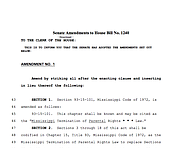Carlyn Hicks, a parent attorney, supports HB 1240 and HB 772, which will clarify parental representation and termination of parental rights law in the state. Photo courtesy Followell Fotography
JACKSON — Johnny's parents divorced just before his fourth birthday. He lived with his mother, but his dad had visitation rights—until he was arrested for public intoxication while taking care of Johnny*.
What followed was a long, repetitive cycle. Johnny's mother tried to repeatedly limit his father's visitation rights as he went in and out of drug and alcohol rehabilitation centers. This continued until Johnny's mother tried to terminate his fathers' parental rights. Johnny's mother had remarried, and her new husband wanted to adopt Johnny, and the lower court originally ruled to terminate Johnny's father's parental rights.
But the Mississippi Supreme Court reversed the ruling.
Terminating parental rights in the state comes with a list of prerequisites, and the high court ruled that in Johnny's case, Chism v. Bright, his mother had not met the first prerequisite spelled out in Mississippi law says that "a child has been removed from the home of its natural parents and cannot be returned to the home of his natural parents."
In Johnny's case, this requirement would not be met unless his mother died, so it seemed almost impossible by the Mississippi Supreme Court's review to grant Johnny's mother her request. In an even more recent case, Pritchett v. Pritchett, the Supreme Court ruled that a mother could not terminate a father's parental rights because he was not granted legal representation or transportation to court hearings while in an MDOC facility, despite three letters requesting services. The father had been convicted of fondling his niece, but the Supreme Court would not terminate his parental rights.
Judges, attorneys and advocates noticed the state's problem, and a task force worked on legislation to fix the state's deadlock on terminating parental rights—while not ignoring the critical need for parents who are in danger of having their rights terminated to have access to legal representation. House Bill 1240 helps clarify and determine specific grounds for terminating parental rights and sets forth procedures about when reunification of a family is required in the state.
House Bill 772 addresses parental representation and clarifies which state offices are responsible for providing counsel to parents in danger of losing their rights.
That bill guarantees that parents whose parental rights are threatened have the right to representation by an attorney from the State Public Defender.
Carlyn Hicks, who has represented parents for three and a half years for Mission First, a Christian mission organization that has a legal aid arm Hicks works in, supports both House Bill 1240 and House Bill 772, which clarifies a parent's right to representation. Hicks said an unintended consequence of the Chism case was that it put a stalemate on proceedings in parental-rights cases, but House Bill 1240 would help judges clarify and make appropriate recommendations for terminating parental rights because it lists specific grounds and application of the current law.
"Up until now, you may have had [courts] operating differently in different counties, it is such a final proceeding, we want to make sure that parents have the right to and the opportunity to be heard and have a fair trial of sorts for those proceedings," Hicks said.
Terminating parental rights should always be the last resort, Hicks said. Sen. Sean Tindell, R-Gulfport, said the same on the Senate floor last week, when the bill provoked a long debate and eventually passed.
Most senators agreed on the floor that reuniting children with their parents and families should be and always is the goal—but at the same time, judges in the state are not ruling on these types of cases in a uniform way. Tindell said that the Senate could not afford to wait another year and put more children potentially in harm's way.
"Vote for this bill and give those children a chance and remember that we have other bills going through this Legislature (like HB 772)," Tindell told the Senate.
Hicks said parental representation and rights cases will be much more consistent when both bills become law.
*Johnny is the name used in the court order and is not the boy's real name.




